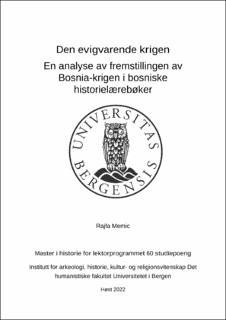| dc.contributor.author | Memic, Rajfa | |
| dc.date.accessioned | 2023-01-24T03:25:43Z | |
| dc.date.available | 2023-01-24T03:25:43Z | |
| dc.date.issued | 2022 | |
| dc.date.submitted | 2023-01-23T09:31:11Z | |
| dc.identifier.uri | https://hdl.handle.net/11250/3045567 | |
| dc.description.abstract | Mer enn to tiår etter avslutningen av krigene i det tidligere Jugoslavia, er minnet om de jugoslaviske krigene sterkt impregnert i de kollektive minnene blant befolkningen. Dette er særlig tilfellet i Bosnia-Hercegovina, hvor krigen mellom 1992 – 1995 hovedsakelig var en krig utkjempet av landets tre nasjonaliteter: bosnjaker, bosniske serbere og bosniske kroater. Gjennom en komparativ tekstanalyse av bosniske historielærebøker over tid og geografi, analyserer følgende oppgave hva slags minnekultur som skapes når de skriver om ‘perioden 1992 – 1995’ og hvordan den har endret seg. Denne historieskriving bærer tydelige preg av at det som følge av krigen utviklet seg tre – et bosnjakisk, et bosnisk serbisk og et bosnisk kroatisk – nasjonale kollektive minner knyttet til krigens forløp, som motstrider hverandre. Oppgaven legger til grunne Maurice Halbwachs forståelse om at kollektive minner er absolutte vilkår for historieskrivingen og Jan Assmanns argumentasjon for at ikke opplevde erfaringer, dvs. kulturelle minner videreformidles blant annet gjennom denne historieskrivingen, til grunne. Funnen tilsier at de historiske fremstillingene om Bosnia-krigen er spunnet rundt dette motsetningsforholdet – mellom ”vår” (les: ”den rette”) - og ”deres” forståelse. De polemiske representasjonene og ulike tolkningene av nasjonalhistorien som uttrykkes i de tre lærebøkene forstås som instrumenter for å styrke den allerede eksisterer kløften mellom folkegruppene i samfunnet, snarere enn å binde gruppene sammen i et multikulturelt Bosnia-Hercegovina, slik utdanningsreformene fordrer. I så måte, understreker oppgaven utdanningsreformenes manglende effektivitet på bakgrunn av de marginale endringene i fremstillingen over tid, samt de fremdeles store geografiske ulikheter. | |
| dc.description.abstract | More the two decades after the end of the Yugoslavian wares, the memory of the wars is still very much alive in the collective memories of the population. This is particularly the case in Bosnia-Herzegovina, where the war between 1992 – 1995 was a war fought by the country's three nationalities: Bosniaks, Bosnian Serbs and Bosnian Croats. By comparing Bosnian history textbooks, from different time periods and geographical origins, this paper aims to analyze the memory culture created by the historical accounts of the Bosnian War, and how it has evolved over time. The historical accounts of the 1992 – 1995 period clearly shows that, as a result of the war, three - a Bosniak, a Bosnian Serb and a Bosnian Croat - national collective memories related to the course of the war has developed, which contradict each other. The foundation of this paper is Maurice Halbwach's understanding that collective memories are absolute prerequisite for historiography and Jan Assmann's argument that not experienced experiences, i.e. cultural memories are passed on, among other things, through this history writing. The finding indicates that the historical accounts of the Bosnian war are spun around this contradictory relationship - between "our" (read: "the right one") - and "their" understanding. The polemical representations and different interpretations of national history expressed in the three textbooks are understood as instruments for strengthening the already existing gap between the ethnic groups in society, rather than binding the groups together in a multicultural Bosnia-Herzegovina, as the educational reforms demand. In this respect, the thesis emphasizes the lack of effectiveness of the educational reforms against the background of the marginal changes in the presentation over time, as well as the still large geographical inequalities. | |
| dc.language.iso | nob | |
| dc.publisher | The University of Bergen | |
| dc.rights | Copyright the Author. All rights reserved | |
| dc.subject | minnekultur | |
| dc.subject | historielærebok | |
| dc.subject | Bosnia-Hercegovina | |
| dc.subject | kulturelt minne | |
| dc.subject | lærebokanalyse | |
| dc.title | Den evigvarende krigen: en analyse av fremstillingen av Bosnia-krigen i bosniske historielærebøker | |
| dc.title.alternative | The Eternal War: an analysis of the historical accounts of the Bosnian war in Bosnian textbooks | |
| dc.type | Master thesis | |
| dc.date.updated | 2023-01-23T09:31:11Z | |
| dc.rights.holder | Copyright the Author. All rights reserved | |
| dc.description.degree | Historie mastergradsoppgave | |
| dc.description.localcode | HIS350 | |
| dc.description.localcode | MAHF-HIS | |
| dc.description.localcode | MAHF-LÆHR | |
| dc.subject.nus | 713107 | |
| fs.subjectcode | HIS350 | |
| fs.unitcode | 11-22-0 | |
